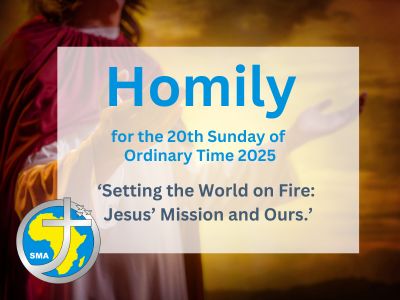Readings: Jeremiah 38:4-6, 8-10; Hebrews 12: 1-4, 8-19, 9-11; Luke 12:49-53
Theme: Setting the World on Fire: Jesus’ Mission and Ours.
By Fr. Michael McCabe, SMA.
In today’s gospel Jesus says: ‘I have come to bring fire on earth, and how I wish it were blazing already’ (Lk 12:4). Jesus was not a guru teaching timeless spiritual truths, but the Messiah sent by God to finally establish his rule of justice, peace, truth and love, first in Israel and then, through Israel, among all nations. As manifested in his words and deeds, this would mean good news for the poor, healing for the sick, and liberation for the enslaved and oppressed.
Jesus’ mission was revolutionary. He wanted to change the world, to set it on fire, – not the fire of hated or division, but the fire of an unquenchable and unconquerable love His entire ministry, especially his outreach to the poor and marginalised, represented an absolute reversal of the scale of values dominant in first century Palestine. He knew, of course, that he would meet with opposition and even rejection from the upholders of the unjust status quo, the powerful religious and political elites of his day. It was this awareness that triggered his statement in today’s gospel that he had come not ‘to bring peace on earth…but rather division’ (Lk 12:50). At first sight this blunt statement seems shocking, contradicting everything we know about Jesus. He was no rabble-rouser, as were many revolutionaries before and after him. On the eve of passion and death, when Peter took out his sword to defend him as he was being arrested, Jesus rebuked him sternly, saying, ‘Put your sword back in its scabbard; am I not to drink the cup that the Father has given me?’(Jn 18:11).
Jesus’ way of establishing God’s reign on earth was not the way of violence. He absolutely rejected the politics of violent revolution adopted by the Zealots (the IRA of his day). He also rejected the strident nationalism of the Pharisees which gave rise to all kinds of divisions among the people. He chose instead the path of redemptive suffering and his model was ‘the suffering servant’ of the Lord. His way was to turn the other cheek, to walk the second mile and, ultimately, to take up the cross. He defeated evil by suffering it in love and forgiving his enemies. Jesus wanted peace, but not peace at any price, not the false peace achieved by violence or by compromise, and he was willing to pay the supreme price for being faithful to his kingdom mission to the bitter end, namely death on a Cross.
Our second reading today from the Letter to the Hebrews exhorts us to imitate the zeal, courage and fortitude that Jesus showed in the face of ‘opposition from sinners’ (Heb 12:3). As disciples of Jesus, we are called to continue his mission in the service of God’s reign. Like him, we will meet with opposition and even rejection. We may not have ‘to keep fighting to the point of death’ (Heb 12:4), but we cannot avoid the cross in one form or another. Our first reading recalls the suffering endured by the prophet Jeremiah during a time of great upheaval in Israel. Accused of undermining the morale of the people of Israel, he was condemned and thrown into a deep well, where he would have died but for the merciful intervention of a foreigner (a Cushite), Ebed-melech. Despite persecution and continued threats to his life, Jeremiah remained faithful to his uncomfortable vocation as God’s spokesperson.
We have more recent examples of prophets who spoke ‘truth to power’, and who suffered for it. The heroic witness of Archbishops Helder Camara and Oscar Romero is well known. Closer to home, the prophetic witness of Dublin Priest, Fr Shay Cullen, has been highlighted recently in the RTE series ‘The Last of the Irish Missionaries’. In 1969, Fr Shay was ordained a priest in the Missionary Society of St Columban and spent over fifty years in the Philippines. There he risked his life and reputation to save thousands of women and children trafficked and lured into prostitution by the lucrative sex industry. He campaigned successfully for the removal of the US Military Naval Base in Subic Bay, which had become a significant factor in the growth of prostitution in the parish where he ministered. The base was closed in 1992.
In 1974 Fr Shay founded the PREDA (Peoples’ Recovery, Empowerment, and Development Assistance) Foundation for the rehabilitation of trafficked and exploited boys and girls. The admirable work of this Foundation continues to this day. Inevitably, Fr Shay’s ministry led him into conflict with powerful political elites. He was harassed, threatened, beaten and arrested multiple times. He was falsely accused and imprisoned. He even survived an attempted assassination. Yet he never gave up defending and upholding the rights and dignity of the most vulnerable and exploited of God’s children. While Fr Shay’s witness has been rightly honoured (he was nominated for the Nobel peace prize three times), we must not not forget the many unheralded men and women who courageously risk their lives to bring God’s reign of justice and love into the darkest corners of our troubled world. Yes, there is no escaping the Cross if we are to be faithful disciples of Jesus. Like Fr Shay, we must not lose heart but persevere ‘in the race we have started’, keeping our focus on Jesus ‘who leads us in our faith and brings it to perfection’ (Heb 12:2).
Listen to an alternative Homily by Tom Casey, SMA:

